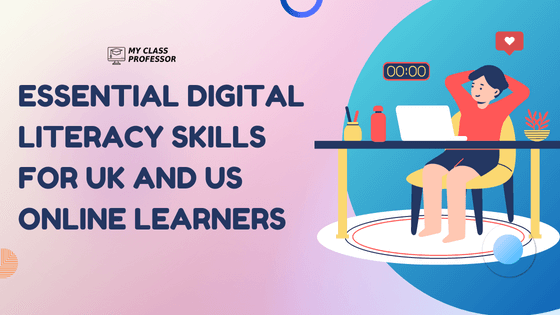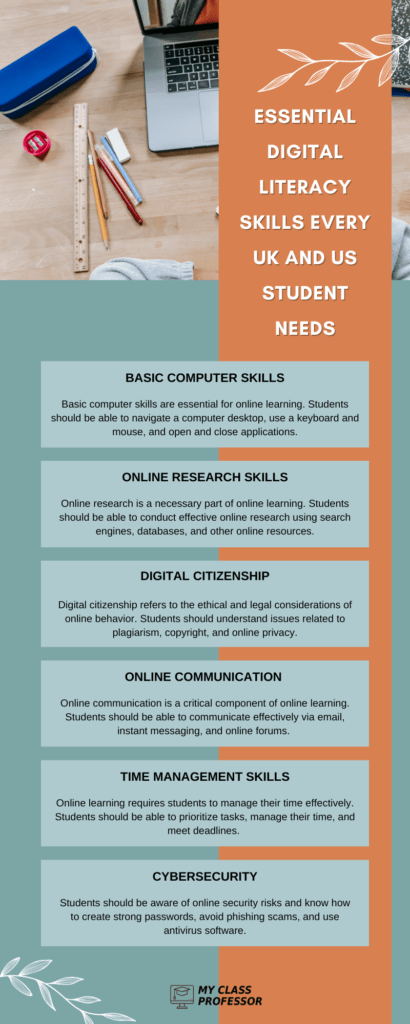
Essential Digital Literacy Skills for UK and US Online Learners
The past few years have seen an unprecedented shift toward online learning as a result of the COVID-19 pandemic. Online learning has become a critical aspect of the educational landscape in both the UK and the US. Now, it has become essential for students to have the necessary digital literacy skills to succeed in this environment. Therefore, if you are a student studying in UK or US, this blog will prove helpful to you.
In this blog post, we will explore the importance of digital literacy in online learning and the specific skills that every UK and US student needs to develop to succeed in this new educational landscape.
What is Digital Literacy?
Digital literacy is the ability to use digital tools and technologies effectively and responsibly. It involves the skills and knowledge necessary to access, evaluate, and use digital information and resources in an informed and ethical manner. In the context of education, digital literacy includes the ability to use online learning platforms, conduct online research, collaborate with others virtually, and protect personal information and data. Also, in the digital world, the trend of online courses has been rising rapidly and this makes students hire someone to do my online class for me. Such students can now easily hire someone online for help.
Importance of Digital Literacy in Online Learning
Digital literacy is crucial for success in online learning. It allows students to effectively navigate the online learning environment and access the wealth of resources available online. Here are a few specific reasons why digital literacy is so important in online learning:
Access to Online Learning Platforms
Online learning platforms are a critical component of online learning. Digital literacy skills enable students to effectively use these platforms to access course materials, communicate with instructors and peers, and submit assignments. Without these skills, students may struggle to effectively participate in online classes.
Communication and Collaboration
Online learning often requires students to communicate and collaborate with their classmates virtually. To contribute effectively to online conversations, turn in assignments, and work on group projects, you must have a solid understanding of digital literacy.
Online Safety and Security
Digital literacy skills include an understanding of how to protect personal information and data online. This includes knowing how to create strong passwords, avoid phishing scams, and use antivirus software. Without these skills, students may be vulnerable to online threats that could compromise their personal information and data.
Conducting Online Research
Digital literacy skills are essential for conducting online research. Students need to know how to find reliable sources online, evaluate the credibility of the information they find, and properly cite their sources. Without these skills, students may struggle to effectively conduct research and complete assignments.
At last, digital literacy is essential for success in online learning. In the digital age, being digitally literate means having the skills and knowledge to effectively navigate and use digital technologies. Furthermore, with more students now learning remotely, digital literacy has become more important than ever.
Read Here: Online Classes vs Traditional Classes: A Comparative Analysis
Skills Every UK and US Student Needs
Now that we have discussed the importance of digital literacy in online learning. Let’s now explore some specific skills that every UK and US student needs to develop to succeed in this environment:

Basic Computer and Mathematical Skills
Basic computer skills are essential for online learning. Students should be able to navigate a computer desktop, use a keyboard and mouse, and open and close applications. Along with computer skills, little mathematical skills are also needed. However, students can learn both skills via online courses and ask an expert to take my online math class of computer classes as well.
Online Research Skills
Online research is a necessary part of online learning. Students should be able to conduct effective online research using search engines, databases, and other online resources. They should also be able to evaluate the credibility of online sources and properly cite their sources.
Digital Citizenship
Digital citizenship refers to the ethical and legal considerations of online behavior. Students should understand issues related to plagiarism, copyright, and online privacy.
Use of Online Learning Platforms
Online learning platforms such as Blackboard and Canvas are commonly used for online courses. Students should be familiar with these platforms, know how to navigate them, access course materials, and submit assignments.
Online Communication
Online communication is a critical component of online learning. Students should be able to communicate effectively via email, instant messaging, and online forums. They should also be familiar with video conferencing tools such as Zoom and Microsoft Teams.
Time Management Skills
Online learning requires students to manage their time effectively. Students should be able to prioritize tasks, manage their time, and meet deadlines. Developing time management skills can help students succeed in online classes and beyond.
Online Collaboration
Online learning often requires collaboration with peers and instructors. Students should be able to work collaboratively online, including using tools such as Google Drive and Microsoft OneDrive.
Online Safety and Security
Students need to understand how to protect their personal information and data online. This includes knowing how to create strong passwords, avoid phishing scams, and use antivirus software.
Cybersecurity
Cybersecurity is critical for protecting personal information and data online. Students should be aware of online security risks and know how to create strong passwords, avoid phishing scams, and use antivirus software.
Without digital literacy skills, students may struggle to participate effectively in online classes and may miss out on valuable learning opportunities. This makes them sometimes ask someone to take my online stats class as well. However, by mastering these digital literacy skills, UK and US students can effectively navigate the online learning environment, communicate and collaborate with others, conduct effective online research, protect their personal information and data, and manage their time effectively.
Conclusion
Digital literacy is essential for success in online learning. Every UK and US student needs to develop the necessary digital literacy skills to navigate the online learning environment effectively. By developing these skills, students can access the wealth of resources available online, communicate effectively with instructors and classmates, and protect their personal information and data online.
FAQs
What are the benefits of being digitally literate?
Being digitally literate provides many benefits, including improved access to information, better learning outcomes, career readiness, flexibility in learning, effective collaboration, and cost-effective learning. Additionally, digital literacy skills are increasingly essential in today’s world, where most aspects of life involve digital technologies.
How can I improve my digital literacy skills?
There are several ways to improve your digital literacy skills.
- Firstly, you can take online courses or tutorials on specific digital tools and technologies.
- Secondly, you can practice using digital technologies in your everyday life, such as using social media, conducting online research, and creating digital content.
- Thirdly, you can collaborate with others and seek feedback to improve your digital literacy skills.
- At last, it is important to stay up to date with new digital technologies and trends, as technology is continually evolving.




